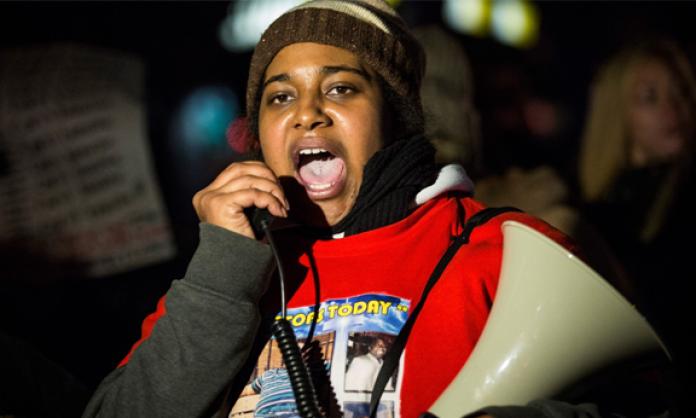Erica Garner, Black Lives Matter activist and daughter of African American Eric Garner, who was brutally murdered by New York City police in 2014, died on 30 December. She was 27 years old.
The proximate cause of death was a heart attack, rare in one so young. The underlying cause was the trauma-induced stress (PTSD) she and her family suffered because of Eric’s murder, the exoneration of the killer cops and the callous way the family was treated by the city authorities, including Democratic mayor Bill de Blasio.
Erica was in the hospital for acute asthma, itself stress-related, when she had the heart attack.
Eric Garner was jumped by a gang of white cops on 27 July 2014, in Staten Island. His “crime” was standing on a street corner allegedly selling individual cigarettes to earn a few dollars.
Officer Daniel Pantaleo put Eric in a chokehold and strangled him to death while the other cops held him down. He pleaded for his life, hoarsely whispering, “I can’t breathe”. Emergency Medical Services (EMS) personnel stood by.
The incident was caught on a mobile phone by a bystander, Ramsey Ortega. Ortega was later arrested by the cops in retaliation. Twenty-four-year-old Erica saw her father’s murder on TV. She became an activist then and there.
In December 2014, a grand jury decided not to indict Pantaleo, setting off a huge march that shut down parts of New York City and the Brooklyn Bridge. There were 50 demonstrations in other cities in solidarity. Erica was at the site of her father’s death in Staten Island.
“This is the spot that EMS workers and police officers failed us New Yorkers, because they let an innocent man die, beg for his life, fight for his last breath”, she said. “And now, I have to come here every time I feel sad … I have to be his voice.”
Kirsten West Savali, a journalist, met Erica in 2016. He told Democracy Now!:
“Erica was very resilient. She didn’t let her grief stop her. She didn’t let her rage make her immobile. She used it to lift her voice for a community of people. She was not afraid to stand alone.”
Erica and her family fought for justice, filing a suit. Mayor de Blasio repeatedly fought the family, refusing to release Pantaleo’s record of abuses. After the city settled, the Citizen Complaint Review Board leaked his record, which included 14 citizen complaints, including physical abuse in a vehicle stop in 2011 and in a stop-and-frisk event in 2012.
Stop-and-frisk was a policy of randomly accosting mainly Black and Brown young men without a warrant and searching them, part of systematic police harassment. Pantaleo’s record has never been officially released, which could have been used in the Garner family’s suit.
Pantaleo wasn’t fired and remains a paid member of the force today.
The Citizen Complaint Review Board is seeking to bring charges against Pantaleo and the other cops, but the Police Department is blocking the effort by using a technical ruse – refusing to provide a number to the case.
Although she remained a fighter, and didn’t let her grief hinder her struggle, the trauma took its toll.
“The fallout from police violence is killing Black women like Erica Garner”, wrote University of Texas professor Christen Smith in a recent article. “When we think of police lethality, we typically consider the immediate body count: the people that die from bullets and baton blows.
“But these numbers do not reveal the slow death that Black women experience. The long range trauma police brutality causes can be as deadly as a bullet. The pain of loss kills with heart attacks, strokes, depression and even anemia.”










